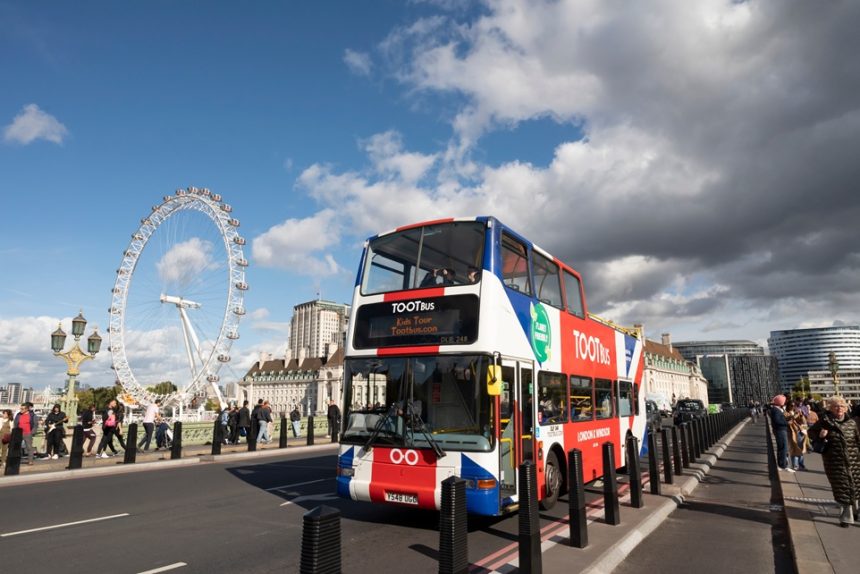A bastion of on-street competition in the bus industry is the London open-top sightseeing sector. Its competitive dynamic has grown in recent years, and with that and the post-2020 landscape have come changes to how business is done, says Tootbus UK Managing Director Gavin Brooking.
Late last year, the RATP subsidiary called for greater regulation of the capital’s open-top market. Work around that is progressing, albeit slowly, he notes. It majors on a voluntary code of conduct. That document is gaining traction. Gavin would like it to be linked to London Service Permit grants, and there are signs of that position ultimately being reached.
More positively, Tootbus reports that trade has built since Easter as the core summer season approached, although Q1 was “tough.” Compounding that is the congestion curse in London, says Gavin, who is responsible for operations in Bath as well as the capital.
Competition is influencing challenging conditions, but as a business that is closely tied to tourism, Tootbus notes two more key factors. One is how visitor numbers from some nations still have not fully rebounded. The other is the number of protests in London. They are a growing – and costly – problem for users of road space in the central area.
London: A challenging environment for open-top tour buses
Visitors from the United States are Tootbus’s second-largest demographic after domestic customers. Travellers from France are a distant third. US numbers are down noticeably from previous years post-pandemic, something Gavin puts down to global geopolitical stress.
Some other international markets are also slow. China, India and Japan are yet to regain 2019 numbers, although he expects them to do so in the long run. “Indians are returning slowly, and I think we are on a good track. But international travellers are still down.”
Of growing influence is the position on protests in London. Each large march costs Tootbus around £30,000. With over 30 of those since October 2023, the impact is easy to calculate. While Gavin acknowledges and defends the right to protest, he believes that the impact on business of such activity is perhaps not always understood.

Reputational management measures are imperative
Wider change since 2020 has been seen in customer behaviour. How travellers use Tootbus services has stayed largely the same, but expectations around cancellation and refund policies have evolved. That knocks on to reputation management.
“Like most businesses, we relaxed that approach during the pandemic, and there is an expectation of it continuing,” Gavin explains. “We had to tighten things up due to commercial realities. Our refund rate is not high, but there are more requests.”
That translates to a need for a close eye on review platforms such as Google and Trustpilot. Tootbus scores well on both, at 4.2 and 4.1 respectively. He notes how for a business in the tourism field, oversight of what is being said online is imperative.
“Reputation management is extremely important and is very much part of our customer journey. I have a very good team of customer service agents. We are very close to our users to ensure that they are looked after properly, but it is something that requires time and attention.”
London congestion crisis hampering open-top tours
On congestion in the capital, Gavin agrees with a recent position by Stagecoach London Managing Director Paul Lynch that it is at an unprecedented level. Scope for delays is extensive. Tootbus has seen instances of tour circuits taking more than double their allotted time. That influences refund activity, he continues.
What Gavin believes is a slack approach to closing roads in central London for filming feeds into those difficulties. But like many in the industry, roadworks are cited by the Tootbus UK chief as the biggest menace. He points to a lack of coordination between schemes as a particular gripe.
“There is no logic to the number that are carried out at the same time and affect a particular area or route.” An increasingly competitive market means that scope to recover additional costs via ticket prices is restricted.

Decarbonisation gains pace for Tootbus
More positively, Tootbus’s decarbonisation journey in London continues to advance strongly. It long since moved away from fossil diesel in favour of HVO, but the next stage of that shift to zero-emission is accelerating.
10 battery-electric retrofits should be in use this month. Gavin speaks highly of Magtec as the supplier carrying out that upcycling work. By year-end, it is hoped that around a quarter of the Tootbus fleet in London will be zero-emission. A plan to reach a fully electric fleet is in place, and the business has solar panels fitted to its depot. Infrastructure partner VEV also gains praise.
On the future, Gavin predicts market consolidation for the London open-top sector. He sees Tootbus’s ongoing product development being built on technology and strategic partnerships with other attractions; the former has already broken cover with the artificial intelligence-powered Tootie city guide.
That forward-looking view indicates that while the market may be challenging, there is still scope for optimism. Tourists from all corners of the globe will always visit London – and open-top providers can drive their value to the capital’s economy if such operators’ needs are considered a little more closely.


























